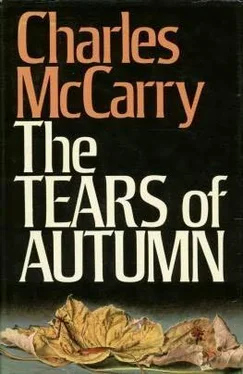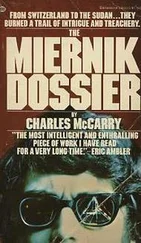Nsango sat in his hut, reading. When Christopher entered on his hands and knees, Nsango put a finger in his book to mark the place and showed him the cover. It was a French translation of one of Albert Schweitzer’s works. Even before he became a terrorist, Nsango had told Christopher that Schweitzer, who lived among black lepers in order to save his own white soul, was the only man in Africa he dreamed of murdering.
“Know thine enemy,” Nsango said.
Christopher took off the bush jacket he had been wearing, wiped the perspiration from the small wire recorder in its breast pocket, and fitted a new spool of wire.
“How did it go?” Nsango asked.
“All right. He’ll talk tonight. He wants to talk to someone.”
“Yes, he’s lonely. He’s above the other Cubans-they’re louts. Manuel is an educated man.”
“What are his communications with the outside?”
“You saw the radio. It breaks down a lot, and the man who knew how to fix it was the one who was bitten by the snake. Manuel has a link with the Russian radio in Dar es Salaam, but sometimes it takes hours to raise them. I think they don’t listen for his transmissions.”
“Would you consider sabotaging the radio?”
Nsango shrugged. “He’ll connect it to you.”
“Not if you’re subtle. The generator operates on a gasoline motor. Put a little dirt in the gas tank.”
“Sooner or later he’s going to describe you to someone in their apparatus.”
“Maybe. But not today.”
“All right, I’ll have it done. Manuel won’t try to transmit until after dark-the sun interferes.”
Christopher stood up and poured water into his mouth from the calabash. He touched Nsango’s Kalashnikov rifle, setting it swinging gently on its hangers.
“I see the weapons have been issued.”
“Only to me and other more advanced natives,” Nsango said. “The men are growing impatient.”
“I counted ten cases of rifles in Manuel’s hut. Your men must want them very badly.”
“Yes. Manuel or one of the other Cubans guards them all the time.”
Christopher sat down on the beaten dirt floor. “How soon do you expect to kill them?” he asked.
“It’s difficult, even though there are only four of them left besides Manuel. I don’t want to use juju again, it leaves the men in a bad way afterward. And the Cubans never go out with us all at once. It’s easiest to do it in a fire fight, so they think it’s the other side.”
“I’d like to see Manuel Ruiz live for a while-a month or two.”
Nsango lay against the twigs and clay of the wall, his legs stretched before him, his hands clasped behind his head.
“Manuel wants to live, too,” he said. “He has zeal for the idea of what he’s doing-not, I think, for the act itself. That’s only a means to an end. He wants to go back to Cuba and tell how black men died like flies for his idea. As I’m the only one who understands the idea, or even knows what Communism is, he needs me. Mine is the only black name he can remember. To him, the others have no names, any more than lions or porcupines have names; they’re fauna. But my name is known in the world, thanks to another white man-you. ‘ I led Alphonse Nsango’s revolution, I am the white explanation for his victory,’ Ruiz will say.”
“Don’t blame me for your fame.”
“No? Then who hired all those boys to paint ‘Nsango’ on the walls in Léopoldville and Brussels, who bribed the journalists and wrote their stories of my heroism, who carried my book through the jungles to a publisher?” Nsango pointed both index fingers at Christopher and laughed. “To whom do I owe this life of adventure and idealism, to whom do I owe Manuel, if not to you?”
“If I’ve done all that for you, then keep Manuel Ruiz alive for me. I may need him again.”
“I don’t know if I can keep him alive, and you, too. He’ll kill you when he’s had time to think.”
“He mustn’t be killed until he’s talked. It may be necessary for him to talk again.”
Nsango’s smile had not left his lips. “All right,” he said.
Christopher knew that a man who is trained to keep secrets can be counted upon, when at last he breaks his oath of silence, to tell everything he knows. The spoiled spy will reveal the true names of his superiors and his agents, he will suggest ways to destroy his own networks. He will bore his interrogators, who until the day before were his enemies, with the details of his thefts, betrayals, unauthorized murders, sexual vices.
Manuel Ruiz had not reached that point, but he was at a more dangerous one: he was an idealist who had done a great thing for his cause. Idealists make brave agents, but they are bad intelligence officers. They cannot exist for long without the company of like minds; they have a need to speak their beliefs and to hear their beliefs spoken. Ruiz wanted to talk and he had no one to talk to.
He did not trust Christopher, but Christopher was white and he knew Ruiz’s ideological vocabulary. Besides, Christopher was in Ruiz’s camp, surrounded by Ruiz’s men, miles from safety. Ruiz imagined that he could kill him whenever he liked.
Ruiz was drunk. Christopher had gone to his hut in the dark, following another Cuban who carried a lantern. Ruiz opened tins-sardines, tuna fish, pineapple, cheese, round un-salted biscuits. They ate from this Utter of food with their fingers and drank Christopher’s vodka, warm in tin cups. For hours they talked about places they had been, Ruiz testing Christopher to see if they knew the same people. Christopher knew some of them in fact and others from hearsay; a few he knew more intimately than Ruiz ever would because he had run agents against them. Ruiz wore a.45 Colt automatic, U.S. Army issue, in a shoulder holster; its butt, like Ruiz’s fingers after dipping into the canned fish, shone with oil.
Manuel left the hut frequently to empty his bowels; he had a bad case of dysentery and it carried the oily food through his body in a torrent. It was after Ruiz came back from one of his trips to the latrine that Christopher saw the idea come into his eyes. It amused Ruiz as an idea for mischief will amuse an intelligent boy. He knew what Christopher wanted to talk about; he would talk. Then he would keep Christopher until he could authenticate him, or kill him.
“These blacks of mine sometimes eat their prisoners,” Ruiz said.
“So I understand.”
Ruiz drank from his canteen cup, his eyes wide open and bright over its rim. “We began to talk about Do Minh Kha and his people this afternoon,” he said.
“I remember.”
“I’ve never heard of you, Charron. Perhaps that should reassure me. You know Do well, do you?
“Well enough. I explained the relationship to you.”
Ruiz looked at the ceiling, swirled the vodka in his cup, fixed his eyes on Christopher; his speech was blurred, and he struggled to enunciate the foreign language he was speaking. He began a sentence in Spanish, stopped himself, and rephrased it in French.
“They have a good revolution, the Vietnamese,” he said. “Like ours-the same enemy, the same devotion, the same practicality.”
Christopher permitted a grin to cover his face, as if he knew a joke too delicious to conceal.
“Do you know Benshikov?” he asked.
“He was in Havana for two years.”
“After that, in Hanoi. Benshikov can be pompous. He wanted to reorganize the North Vietnamese service on KGB lines. Do told Benshikov that the Soviet service was too bureaucratic to have imagination. Do said you Cubans had the best service in the world, because your revolution is still young enough to feel hunger and rage.”
Ruiz nodded, accepting the compliment. “Do told me that story, too,” he said.
Читать дальше












